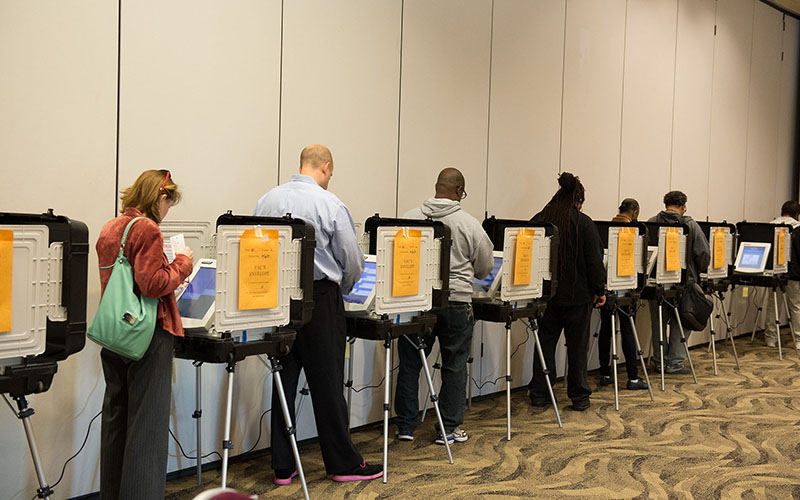WASHINGTON – A federal appeals court handed Arizona Democrats their second defeat in a week Wednesday, refusing to block a state law that lets elections officials reject ballots cast by people who were not at their assigned polling place.
A group of Democratic and minority organizations said the “out of precinct” policy violated the Voting Rights Act because it resulted in a disproportionately larger share of minority and low-income voters’ ballots beimg rejected.
But a three-judge panel of the 9th U.S. Circuit Court of Appeals said the claim was not strong enough to justify blocking the decades-old law – over the angry dissent of Chief Judge Sidney Thomas.
“Voting should be easy in America. In Arizona, it is not, and the burden falls heaviest on minority voters,” Thomas wrote.
The ruling comes just days after the same panel on Friday, split the same way, rejected the same plaintiffs’ challenge to another state voting law that makes it a felony for most people to collect and deliver other people’s ballots.
In a statement Thursday, Arizona Secretary of State Michele Reagan welcomed the two rulings, which she said will “allow election officials to run our elections smoothly and improve ballot security.”
In both cases, the circuit court panel upheld the decision of a district court judge who had refused to block the two laws while the cases were pending.
The latest case involved a 1979 Arizona law that said people voting in person on Election Day have to do so at their assigned polling place.
Early voting in can be done at any number of voting centers, and mailed ballots can be turned in on Election Day at any polling place, but the in-person, Election-Day vote has to be cast at the assigned precinct. That voter can cast a provisional ballot, but it must be rejected if election officials later determine the voter was at the wrong precinct.
The plaintiffs – which included state and national Democratic parties and campaigns, Hispanic and Native American voters – argued that the policy hit minority and low-income voters hardest, since they were most likely to move between elections, among other problems. They also presented expert testimony that provisional ballots of minority voters were more often rejected than those of white voters under the law.
But Circuit Judge Carlos Bea, who wrote the majority opinion, said the issue of out-of-precinct voting is relatively small: He cited the lower court’s estimate that only 0.5 percent of votes cast in 2012 were voided as out-of-precinct.
Circuit Judge Sidney Thomas
Thomas disagreed, arguing that those votes could have been the deciding factor in several close races across the state, from as long as 100 years ago to just this August, when Andy Biggs beat Christine Jones by just 27 votes for the GOP nomination in the 5th District race for Congress.
Numbers aside, Bea said there was not sufficient evidence that the precinct vote rule is impermissibly burdensome on voters, pointing to “substantially more demanding rules” on voting, such as requiring a government-issued ID.
“Being required to go to the proper polling location cannot be deemed a burden on voting, as this requirement is inherent to the very essence of in-person voting,” Bea wrote.
Because the rule “probably does not impermissibly burden minority voters by giving them less opportunity than non-minorities to participate in the political process,” there is no reason to reverse the district court ruling and block the law, he wrote.
The rule is in place for a reason, Bea wrote, to allow for orderly and efficient voting. The district court was “clearly cognizant of the impending election and the cost that granting preliminary injunctive relief would have for both Arizona’s election budgets as well as uncertainty in light of last-minute rule changes,” he wrote.
In his dissent, Thomas said Phoenix and Tucson are two of the top cities in the nation for casting provisional ballots, partially due to the frequency in which voters in those regions change location. He said Arizona is “among the nation’s leaders” for provisional ballots cast, and “leads the nation, by a wide margin, in the number of provisional ballots rejected, and therefore not counted.”
But the numbers don’t matter as much as the principle, he wrote.
“What matters … is not how many minority voters are being denied equal electoral opportunities, but simply that ‘any’ minority is being denied equal electoral opportunities,” Thomas wrote.
“Black votes matter. Hispanic votes matter. Native American votes matter. White votes matter. All votes matter.”
